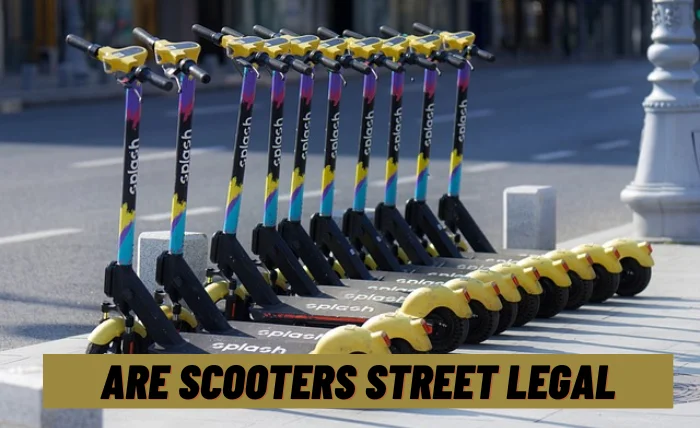Electric and kick scooters provide a fun, eco-friendly way to get around. Their popularity has exploded in recent years. But are those fun little two wheelers legal to ride on public roads, bike lanes, and sidewalks? The answer varies depending on where you live and factors like vehicle classifications and codes. The laws in your region ensure you can cruise worry free and avoid pesky tickets.
This article clearly explains whether electric and kick scooters are street-legal transportation. We’ll examine how regulations differ between cities, across states, and other countries, as well as evolving policy changes. Soon, you’ll know where to ride legally and how to stay safe.
Table of Contents
Are Scooters Street Legal Defining Street Legality

When it comes to scooters, street legality is crucial. To navigate this, one must first grasp the vehicle classifications. Scooters often fall into different categories, including mopeds and motorized scooters. Knowing where your scooter fits is the first step to ensuring it meets legal standards.
Overview of Vehicle Classifications
The distinctions between various vehicle classifications are essential. Mopeds, for instance, typically have lower engine capacities and specific speed limits. Motorized scooters, on the other hand, may vary in their specifications.
Knowing which category your scooter belongs to allows you to adhere to the appropriate regulations and enjoy the freedom of the open road within legal bounds.
Registration
Registering your scooter is a crucial aspect of achieving street legality. Different regions may have varying requirements, but a common thread is the need for proper documentation.
This process often involves providing details about your scooter, such as its make, model, and vehicle identification number (VIN). Registering your scooter ensures that it is recognized by the authorities, paving the way for lawful use on public roads.
Driver’s License
Securing the proper license is another critical step. Depending on your scooter’s classification, the licensing requirements may differ. Some regions might demand a regular driver’s license, while others could necessitate a specific scooter license.
Ensuring you possess the correct license keeps you within the legal framework and promotes safety by confirming your ability to handle the scooter on public roads.
Safety Requirements
Street legality involves more than paperwork; safety is paramount. Adhering to safety requirements is a responsibility that accompanies riding a scooter. This may include wearing a helmet, obeying traffic rules, and ensuring your scooter meets safety standards.
Prioritizing safety keeps you and others secure and contributes to maintaining the positive image of scooter riders on the road.
Federal Laws and Guidelines
Navigating the legal landscape involves familiarity with federal laws and guidelines. These overarching regulations set the foundation for scooter street legality. Complying with these standards ensures that your scooter aligns with the broader legal framework, allowing you to cruise confidently without worrying about federal regulations.
Consumer Safety
Manufacturers play a pivotal role in ensuring scooters meet safety standards. Adhering to consumer safety guidelines during the production process is crucial. This includes incorporating safety features, conducting quality checks, and providing clear user instructions.
By choosing scooters from manufacturers committed to these standards, riders contribute to the overall safety and compliance of their chosen mode of transportation.
Rules for Scooter
Scooter enthusiasts eager to explore federal lands must know specific rules governing their use in such areas. These regulations may vary, encompassing speed limits, designated paths, and adherence to environmental considerations.
Being mindful of and respecting these rules maintains the legality of scooter use on federal lands and must be aware of the preservation of natural spaces for all to enjoy responsibly.
Mobility Scooters
For those relying on mobility scooters, adhering to the Americans with Disabilities Act (ADA) is necessary. These regulations dictate accessibility standards, ensuring mobility scooters are designed to accommodate particular with disabilities.
Complying with ADA requirements, the legal use of mobility scooters and promotes inclusivity and equal access for individuals with diverse mobility needs.
State Laws
Navigating the street legality of scooters starts with a keen awareness of state laws. Each state may have its own set of regulations governing scooter use. Familiarising yourself with these laws ensures you can confidently cruise the streets without worrying about violating local regulations.
Regulations, Restrictions
Delving into the specifics, it’s crucial to grasp the regulations, restrictions, and allowances each state imposes on scooter riders. Speed limits, age restrictions, and designated paths can vary significantly. Staying informed about these details ensures you operate your scooter under the law, avoiding any unnecessary legal complications.
Differences Between States in Vehicle Codes
Vehicle codes vary from state to state, influencing the operation and registration of scooters. These differences are crucial to ensuring your scooter is compliant.
From registration requirements to operational guidelines, aligning with the specific vehicle codes of your state guarantees a hassle-free and lawful riding experience.
Licensing and Helmet Requirements
Securing the correct license and adhering to helmet requirements are crucial for street legality. Licensing requirements may differ, with some states mandating a regular driver’s license and others requiring a specific scooter license.
Helmet regulations vary, emphasizing the importance of protective headgear for rider safety. Complying with these state-specific mandates keeps your scooter journey legal and secure.
Local City and County Ordinances
To ride your scooter legally, it’s essential to grasp local city and county ordinances. These regulations dictate where scooters can be ridden within metro areas. Familiarising yourself with these local rules ensures that your scooter journey complies with specific city and county laws.
Ridden in Metro Areas
The permissible areas for scooter use within metro areas are crucial. Local ordinances often designate specific paths, lanes, or areas where scooters are allowed. Staying within these boundaries ensures you enjoy a hassle-free and legal ride while respecting the guidelines set by the local community.
Municipal Codes Banning
Some municipalities may have codes in place either banning or regulating scooter usage. These codes might include restrictions on speed, parking, or specific routes. Familiarising yourself with these municipal codes is essential to avoid legal complications and ensure your scooter usage aligns with local regulations.
Special Regulations
If you opt for a rental scooter, be aware of special regulations that may apply. Cities often have specific rules governing rental scooter companies, addressing parking, fleet size, and operational guidelines. Adhering to these regulations ensures your ride is legal and contributes to the community’s responsible and sustainable use of shared scooter services.
Final Thoughts
The legality of scooters involves navigating a complex web of federal, state, and local regulations. Being informed is critical, from vehicle classifications and safety requirements to state-specific laws and municipal ordinances.
So, the next time you ask, Are Scooters Street Legal? Remember, compliance with these diverse regulations ensures a worry-free and lawful ride on your electric or kick scooter.
